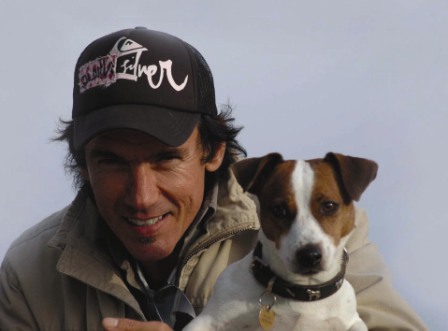André Carl van der Merwe is a South African author
who knows all too well how the media portrays
homosexuality and religion, especially being a young gay man. His best-selling
novel, Moffie, is about to be made into a movie and he hopes that the
religious
aspects are portrayed correctly.
In the acknowledgements of the book André says, “As a gay
man with deep spiritual desires, my only way of processing the confusion
I felt about my sexuality was to write about it. The church regarded
me as sinful, the government told me it was unlawful and the rest of
society considered it offensive.”
André says that the book, in part, deals with the struggle that
a person faces when his genetic coding places him on the opposite side
of what religion regards as pure or holy. The story describes the turmoil
that a child faces when his entire frame of reference is telling him
that he is evil and doomed to hell.
Although Moffie is a work of fiction, it is based on the journals that
André wrote whilst serving in the South
African Defence Force during the 1980s. The story follows Nicholas van
der Swart, the son of an Afrikaans father and Catholic English-speaking
mother. From an early age he realises that he is different, and when
he doesn’t meet his father’s expectations, he is called
a moffie and told to act like a real man. Things soon get worse when
Nicholas is called up for national service, a place where homosexuality
is forbidden. It was regarded as a sin against God and the country.
André says that the difficulties he went through as far as religion
is concerned were more difficult than the army. He feels that it is
important that the pressure religion put on him – and still does
put on many people of different sexual orientations – must be
clearly portrayed in the movie-version of the book.
André makes a differentiation between
being religious and being spiritual. “I think it’s important
to clearly identify the difference of worshipping a ‘vehicle’
(religion) or embarking on a path of spiritual awakening. I think people
are caught up in the ‘rules’ of religion and forget to focus
on the essence of connecting to ‘The Master of the Universe’,
whoever He or She may be to you.” He says that people must remember
that a vast number of people died in wars in the name of Christ when
Jesus preached “love your enemy”.
“Think of the Christ you read about in the Bible, a gentle dude
that sides with the riff-raff of society, fought the system and was
friends with prostitutes, beggars and lepers. Then look at the Pope
in all his pomp and grandeur – they seem very far apart,”
emphasises André.
André’s feeling towards the media has changed vastly from
when he was a young boy. “I think free speech is important and
I like to think that we live in a society where that is mostly the case,
as far as mainstream media is concerned,” he says. He believes
that the media is a business and is just the voice of the people.
“I don’t really see them as having a social conscience,
but rather they report on what is taking place and what they believe
people will want to see or read,” he says.
In the dedication of his book André wrote, “May we all
one day live in a world of compassion rather than self-seeking superiority.”
He feels that the gay debate that is going on in the media with regard
to the Dutch Reformed Church is ludicrous.
He says this issue must be fought hard against as it is absurd to think
that a church can condone such discrimination, particularly referring
to its history of human rights abuses in its “murky past”.
“I don’t know how a church that preaches ‘do not judge’
can justify this judgemental behaviour.”
He believes that their argument, which is based on the Bible, cannot
be justified. “The Bible also condones slavery and says that women
are not allowed to talk in church or even ask a question – they
must be subservient to their husbands, something that is now considered
socially unacceptable. In the Old Testament the Bible even condones
stoning another human being.”
André is happy with the publicity his book has
received and believes that the South African media has been generally
fair, open and enlightened. When it comes to religion and the media,
André is satisfied with the way they have handled his book, especially
in such a “conservative society as South Africa”, he said.
André wants his book to portray a slice of history with a subtle
message of acceptance and open- mindedness. “What a world it could
be if everyone opened their minds just a fraction and accepted those
who are slightly different.” SMF
